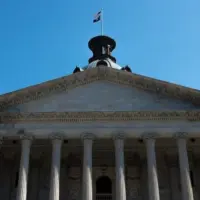
(COLUMBIA, S.C.) — A few South Carolina lawmakers are holding a hearing on Tuesday to discuss a near-total abortion ban that removes exceptions and could send anyone involved with termination of a pregnancy to prison for decades.
Currently, the state has a six-week abortion ban, signed into law in May 2023, with limited exceptions for rape and incest up to 12 weeks, for fetal anomalies and to save the life of the pregnant person.
However, S.323, also called the “Unborn Child Protection Action,” which is currently being debated in a state subcommittee, would repeal the rape, incest and fetal anomalies exceptions as well as make abortion a felony comparable to “the homicide of a person born alive,” which, if it clears a series of legislative hurdles, could send people who have an abortion to prison for up to 30 years.
If the bill clears the committee, there will be a few other legislative steps before it’s debated during the state legislature’s regular session.
Those who aid, abet or perform an abortion could also face up to three decades in prison.
Additionally, the bill would make it unlawful to possess abortion pills or provide information about an abortion, make it a felony to transport a minor out of state to obtain an abortion, change the definition of legal contraceptive, and redefine embryos as full legal persons, which opponents of the bill say could threaten IVF access.
Opponents argue the bill would be one of the strictest pieces of legislation limiting access to reproductive health care seen in the U.S. and could have far-reaching effects.
“If people think that there are exceptions here, I want to reiterate that there are none,” Amalia Luxardo, CEO of the nonprofit advocacy organization Women’s Rights and Empowerment Network (WREN), told ABC News. “There are none here. … Historically there have been exceptions when legislation like this comes down. And so, it really is, quite literally, the most extreme piece of legislation that we’ve seen in the [reproductive health care] space ever in this country. “
Luxardo said that WREN will be among the groups demonstrating at the state capitol on Tuesday as the bill is discussed during a second hearing of the South Carolina Senate Medical Affairs subcommittee.
The first hearing in October lasted several hours with dozens of people testifying during public comment. The hearing on Tuesday will not be open to the public, but people are able to watch a stream.
Nimra Chowdhry, senior state legislative council with the Center for Reproductive Rights, told ABC News that because the hearing is without public comment, it’s difficult for opponents to weigh in on why the bill is “problematic.”
However, she said advocates are continuing to put pressure on lawmakers by having constituents call up their representatives, sharing personal stories of people who have struggled to get abortion care in harrowing situations and legal reasonings behind why some consider the bill unconstitutional.
Chowdhry added that she is concerned that, if the bill passes, lawmakers in other states could replicate the legislation with similar language and penalties.
“We have seen time and time again, when very restrictive legislation sees the light of day, and if it potentially has a chance of moving through the legislature and getting signed and getting enacted, other hostile states very often follow suit,” she said. “Once we see a bill get enacted, we see that kind of momentum get pushed forward. It really opens the door for other states to do something similar.”
Luxardo agreed, adding that if the legislation passes, she believes it could deter providers from practicing in South Carolina.
The bill has also caused friction among anti-abortion rights groups, with some saying S.323 goes too far.
South Carolina Citizens for Life said that while it supports the current six-week ban, it opposes the criminalization of those who receive an abortion.
“Criminalizing women who have an abortion is inconsistent with our decades of work to legally protect both the unborn and the mother,” the statement reads. “Pro-lifers understand better than anyone else the desire to punish the purveyors of abortion who act callously and without regard to the dignity of human life. But turning women who have abortions into criminals, as S.323 does, is not the way.”
Other groups, such as Equal Protection South Carolina (EPSC), have supported the bill. EPSC stated it hopes legal equal protection in the bill can be expanded “for all pre-born babies beginning at fertilization.”
When asked for comment, EPSC pointed ABC News to a September statement.
“We are encouraged by the sentiment of the bill and the bill author’s passion to end abortion,” the group wrote. “The imposition of a criminal penalty in all parties involved in an abortion is a laudable departure from the approach traditionally taken by the Pro-Life establishment, which advocates for legislation providing total legal immunity to mothers who willfully murder their pre-born children.”
Co-sponsors of the bill, including state Sens. Richard Cash, Billy Garrett and Rex Rice, did not immediately return ABC News’ requests for comment.
Copyright © 2025, ABC Audio. All rights reserved.














